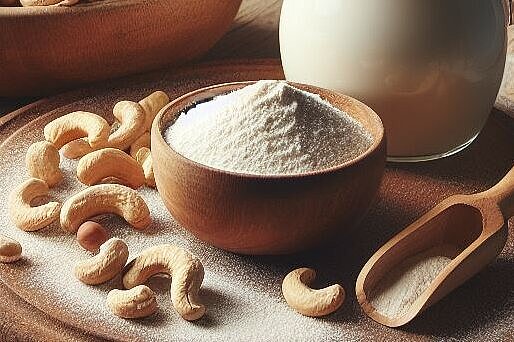Soy milk powder
What is soy milk powder?
Soymilk powder is produced by dehydrating liquid soymilk until a fine powder is obtained. This powder can be dissolved in water to reconstitute soy milk or used as a dry dietary supplement. It provides a lactose-free, plant-based source of protein that is rich in vitamins and minerals. Soy milk powder is often used by vegans and people with lactose intolerance, but its use in dogs is a relatively new concept.
Benefits of soy milk powder for dogs
Lactose-free hydration
- Digestive tolerance: For dogs that are lactose intolerant, soy milk powder offers a digestion-friendly way to meet their hydration needs.
Protein source
- Muscle maintenance: As a good source of protein, soy milk powder can help maintain muscle mass in dogs, which is particularly beneficial for older dogs.
Rich in nutrients
- Health promotion: Soy milk powder is rich in essential fatty acids, vitamins and minerals that can support overall health.
Disadvantages and concerns
Despite its benefits, there are several concerns regarding the use of soymilk powder in dog diets.
Allergy potential
- Reactive sensitivities: Soy is a known allergen in dogs, which can lead to digestive problems, skin rashes and other allergic reactions.
Phytoestrogens
- Hormonal imbalances: The phytoestrogens found in soy milk powder can affect hormonal balance in dogs and lead to health problems.
Nutrient imbalance
- Incomplete profile: Soymilk powder should not be used as a complete food as it may not provide all the nutrients a dog needs in the quantities required.
Use and dosage
Before giving your dog soy milk powder, there are some important guidelines to follow:
- Introduction: start with small amounts and monitor your dog for signs of allergic reaction or intolerance.
- Quality: Choose high-quality, non-GMO soymilk powder without additives or sweeteners.
A balanced decision
Soy milk powder can be a useful addition to your dog's diet in certain circumstances, particularly as a source of protein or lactose-free hydration. However, it is crucial to consider the potential risks and high allergy potential of soy. Careful introduction and observation are essential to ensure that your dog reacts positively to the soy milk powder.
If you notice any signs of hypersensitivity or poisoning in your dog, you should see your vet immediately. We are not a substitute for a vet, but we try to be as accurate as possible. Every dog reacts differently and we recommend you get a second opinion or consult your vet if in doubt.
Stay healthy and take good care of your four-legged friend!😊
Similar to Soy milk powder
Cashew milk powder is made by drying liquid cashew milk, which in turn is produced by soaking and then blending cashew nuts with water. The resulting powder is lactose-free, rich in nutrients and...
Oat milk powder is made from whole grain oats that are first soaked in water, then ground and finally dried into a fine powder. This powder can then be mixed with water to make oat milk or used...
Almond milk powder is made by removing water from liquid almond milk until a dry, storable powder is obtained. This powder can be rehydrated with water if required to produce a milk-like liquid that...
Coconut milk powder is a plant-based milk substitute obtained from the coconut. It contains about 60% fat, 7% protein, 25% carbohydrates and 6% fiber. It is rich in saturated fatty acids, especially...



